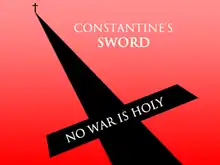Constantine's Sword (film)
James Carroll's Constantine's Sword, or Constantine's Sword, is a 2007 premised documentary film on the relationship between the Catholic Church and Jews. Directed and produced by Oscar-nominated filmmaker Oren Jacoby, the film is inspired by former priest James P. Carroll's 2001 book Constantine's Sword.[1][2]
| Constantine's Sword | |
|---|---|
 The central visual symbol of the film, Constantine's Sword. | |
| Directed by | Oren Jacoby |
| Written by | Oren Jacoby James Carroll |
| Produced by | Mick Garris Robb Idels John Landis |
| Narrated by | Amanda Pays |
| Cinematography | Robert Richman |
| Edited by | Kate Hirson |
Running time | 93 minutes |
| Country | United States |
Synopsis
The title page of this film shows the shadow of a cross, with "No war is holy" written across the transept. Constantine’s Sword is the story of James P. Carroll's journey to uncover the roots of war. Carroll, a former Catholic priest whose father (Joseph Carroll) was a famous Air Force general, implies that there has been a relationship between religiously inspired violence and war, beginning with the adoption of Christianity by the Roman Emperor Constantine I in 312 AD. The counter balance to this view that most wars are political or economic in nature is not discussed, nor are the circumstances of attacks on European Christendom through the ages by hostile forces, secular or alien religions. Constantine was convinced that he had won a battle because he had followed the instructions of a vision, to inscribe a sign of the cross (the Labarum) on the shields of his soldiers. At the time most of Constantine's legionaries were Christians themselves including Constantine's mother St. Helena. In Carroll's view, this event marked the beginning of an unholy alliance between the military and the Church regardless of the fact that most members of a military belong to that particular country's religion. Carroll's thesis is explained as his father's supposed translation to Carroll's question as a boy of what the letters IHS stood for in churches, being the IHS monogram for the name of Jesus, as Constantine's vision of "In hoc signo vinces", "in this sign you will conquer", giving a fabricated union of state military with church dogma.
Carroll focuses on Catholic and evangelical anti-Judaism, and invokes the cross as a symbol of the long history of Christian xenophobic violence against Jews and non-Christians,[3][4] from the Crusades, through the Roman Inquisition and the creation of the Jewish ghetto, to the Holocaust. Carroll also charges that there is an ongoing evangelical infiltration of the U.S. military, and that this has had negative consequences for U.S. foreign policy. The film's final chapter, "No war is holy", concludes with views of military cemeteries as Aaron Neville sings "With God On Our Side".
Technical details
- 95 minutes
- Languages in film: English, German, Italian and Yiddish
- Cast/Featuring: Liev Schreiber, pastor Ted Haggard, Philip Bosco, Natasha Richardson, Eli Wallach
- Director: Oren Jacoby
- Producers: Oren Jacoby, James Carroll, Michael Solomon, Betsy West.
- Supervising producer: Elgin Smith
- Screenwriters: James Carroll, Oren Jacoby
- Production company: Storyville Films
- Studio: First Run Features
See also
- Constantine's Sword (2001) book by James P. Carroll
References
- "Synopsis". constantinessword.com. Retrieved 2012-01-07.
- "Woodstock Film Festival". Woodstock Film Festival. 2007-10-14. Retrieved 2012-01-07.
- Constantine's Sword (2008) Archived 2008-04-20 at the Wayback Machine, HollywoodJesus.com
- Chris Barsanti. Constantine's Sword film review Archived 2008-10-03 at the Wayback Machine at Filmcritic.com.
External links
- Constantine's Sword at IMDb
- Film's website
- Recommendation by Tikkun magazine
- At Rotten Tomatoes
- Link to production company
- James Carroll's Unholy Crusade: A Critique of the Film Constantine's Sword from First Things
- Voices on Antisemitism Interview with James Carroll from the United States Holocaust Memorial Museum